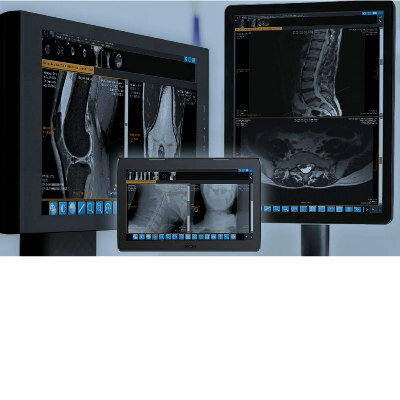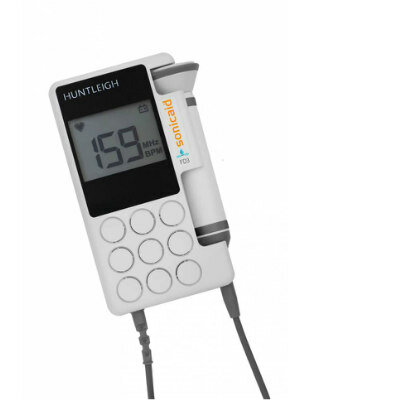Agfa Launches RUBEE for AI at RSNA 2020
|
By MedImaging International staff writers Posted on 09 Dec 2020 |

Illustration
Agfa HealthCare (Mortsel, Belgium) has launched RUBEE for AI at RSNA 2020 that enables hospitals to embed best in class artificial intelligence (AI) to their Enterprise Imaging ecosystem.
Hospitals, imaging departments and radiologists are under tremendous pressure, with the ever-increasing demand for images to meet today’s health challenges. RUBEE for AI lays the foundation and framework for analytically intelligent “clinical packages” embedded within Enterprise Imaging, helping improve radiology efficiency with enhanced decision support. RUBEE forms the core of the Enterprise Imaging platform. RUBEE helps visualize the metadata generated by the AI algorithms, and then uses that information to automate and optimize the clinical workflows, supporting radiologists to increase productivity and enhance informed decision making, while also maximizing the value of their own expertise.
The market for healthcare-based AI algorithms has boomed, leaving hospitals faced with an increasing number of individual applications to choose from. RUBEE for AI takes away the time-consuming guesswork of choosing and implementing each algorithm, with specialty AI packages that address specific clinical needs. The AI applications have been carefully selected to verify they come from reliable solution providers, use the right datasets, follow industry standards, and are integrated seamlessly. Hospitals may also decide to use RUBEE for AI to embed their own choice of AI applications, including for research and academic use leveraging the Enterprise Imaging academic teaching and peer learning workflows.
With the RUBEE for AI, specialty packages are seamlessly embedded into radiology workflows. The Breast AI package provides powerful tools for cancer risk-based triage, along with natively embedded CAD AI visualizations and advanced 2D/3D mammography tools, while the CT Lung AI package improves visualization of nodules and comparisons, enables sorting and triage, and smart display of AI findings.
“With Enterprise Imaging, Agfa HealthCare has already taken a forward thinking approach, with a single, multi-specialty industry recognized imaging platform,” said Dr. Anjum Ahmed, Chief Medical Officer, and Global Director of Innovation at Agfa HealthCare. “RUBEE for AI leverages this platform, and enables a care pathway focused curation of niche and specialty focused AI applications. This approach is much more clinically valuable, analytically intelligent and productivity driven compared to a separate AI platform or marketplace. And by providing radiologists with carefully curated AI decision support tools, embedded in their Enterprise Imaging solution, we support them to maximize the value of their own skills and expertise, and become consultative powerhouse of evidence-based intelligence.”
Hospitals, imaging departments and radiologists are under tremendous pressure, with the ever-increasing demand for images to meet today’s health challenges. RUBEE for AI lays the foundation and framework for analytically intelligent “clinical packages” embedded within Enterprise Imaging, helping improve radiology efficiency with enhanced decision support. RUBEE forms the core of the Enterprise Imaging platform. RUBEE helps visualize the metadata generated by the AI algorithms, and then uses that information to automate and optimize the clinical workflows, supporting radiologists to increase productivity and enhance informed decision making, while also maximizing the value of their own expertise.
The market for healthcare-based AI algorithms has boomed, leaving hospitals faced with an increasing number of individual applications to choose from. RUBEE for AI takes away the time-consuming guesswork of choosing and implementing each algorithm, with specialty AI packages that address specific clinical needs. The AI applications have been carefully selected to verify they come from reliable solution providers, use the right datasets, follow industry standards, and are integrated seamlessly. Hospitals may also decide to use RUBEE for AI to embed their own choice of AI applications, including for research and academic use leveraging the Enterprise Imaging academic teaching and peer learning workflows.
With the RUBEE for AI, specialty packages are seamlessly embedded into radiology workflows. The Breast AI package provides powerful tools for cancer risk-based triage, along with natively embedded CAD AI visualizations and advanced 2D/3D mammography tools, while the CT Lung AI package improves visualization of nodules and comparisons, enables sorting and triage, and smart display of AI findings.
“With Enterprise Imaging, Agfa HealthCare has already taken a forward thinking approach, with a single, multi-specialty industry recognized imaging platform,” said Dr. Anjum Ahmed, Chief Medical Officer, and Global Director of Innovation at Agfa HealthCare. “RUBEE for AI leverages this platform, and enables a care pathway focused curation of niche and specialty focused AI applications. This approach is much more clinically valuable, analytically intelligent and productivity driven compared to a separate AI platform or marketplace. And by providing radiologists with carefully curated AI decision support tools, embedded in their Enterprise Imaging solution, we support them to maximize the value of their own skills and expertise, and become consultative powerhouse of evidence-based intelligence.”
Latest Industry News News
- Bayer and Google Partner on New AI Product for Radiologists
- Samsung and Bracco Enter Into New Diagnostic Ultrasound Technology Agreement
- IBA Acquires Radcal to Expand Medical Imaging Quality Assurance Offering
- International Societies Suggest Key Considerations for AI Radiology Tools
- Samsung's X-Ray Devices to Be Powered by Lunit AI Solutions for Advanced Chest Screening
- Canon Medical and Olympus Collaborate on Endoscopic Ultrasound Systems
- GE HealthCare Acquires AI Imaging Analysis Company MIM Software
- First Ever International Criteria Lays Foundation for Improved Diagnostic Imaging of Brain Tumors
- RSNA Unveils 10 Most Cited Radiology Studies of 2023
- RSNA 2023 Technical Exhibits to Offer Innovations in AI, 3D Printing and More
- AI Medical Imaging Products to Increase Five-Fold by 2035, Finds Study
- RSNA 2023 Technical Exhibits to Highlight Latest Medical Imaging Innovations
- AI-Powered Technologies to Aid Interpretation of X-Ray and MRI Images for Improved Disease Diagnosis
- Hologic and Bayer Partner to Improve Mammography Imaging
- Global Fixed and Mobile C-Arms Market Driven by Increasing Surgical Procedures
- Global Contrast Enhanced Ultrasound Market Driven by Demand for Early Detection of Chronic Diseases
Channels
Radiography
view channel
Novel Breast Imaging System Proves As Effective As Mammography
Breast cancer remains the most frequently diagnosed cancer among women. It is projected that one in eight women will be diagnosed with breast cancer during her lifetime, and one in 42 women who turn 50... Read more
AI Assistance Improves Breast-Cancer Screening by Reducing False Positives
Radiologists typically detect one case of cancer for every 200 mammograms reviewed. However, these evaluations often result in false positives, leading to unnecessary patient recalls for additional testing,... Read moreMRI
view channel
PET/MRI Improves Diagnostic Accuracy for Prostate Cancer Patients
The Prostate Imaging Reporting and Data System (PI-RADS) is a five-point scale to assess potential prostate cancer in MR images. PI-RADS category 3 which offers an unclear suggestion of clinically significant... Read more
Next Generation MR-Guided Focused Ultrasound Ushers In Future of Incisionless Neurosurgery
Essential tremor, often called familial, idiopathic, or benign tremor, leads to uncontrollable shaking that significantly affects a person’s life. When traditional medications do not alleviate symptoms,... Read more
Two-Part MRI Scan Detects Prostate Cancer More Quickly without Compromising Diagnostic Quality
Prostate cancer ranks as the most prevalent cancer among men. Over the last decade, the introduction of MRI scans has significantly transformed the diagnosis process, marking the most substantial advancement... Read moreUltrasound
view channel
Deep Learning Advances Super-Resolution Ultrasound Imaging
Ultrasound localization microscopy (ULM) is an advanced imaging technique that offers high-resolution visualization of microvascular structures. It employs microbubbles, FDA-approved contrast agents, injected... Read more
Novel Ultrasound-Launched Targeted Nanoparticle Eliminates Biofilm and Bacterial Infection
Biofilms, formed by bacteria aggregating into dense communities for protection against harsh environmental conditions, are a significant contributor to various infectious diseases. Biofilms frequently... Read moreNuclear Medicine
view channel
New SPECT/CT Technique Could Change Imaging Practices and Increase Patient Access
The development of lead-212 (212Pb)-PSMA–based targeted alpha therapy (TAT) is garnering significant interest in treating patients with metastatic castration-resistant prostate cancer. The imaging of 212Pb,... Read moreNew Radiotheranostic System Detects and Treats Ovarian Cancer Noninvasively
Ovarian cancer is the most lethal gynecological cancer, with less than a 30% five-year survival rate for those diagnosed in late stages. Despite surgery and platinum-based chemotherapy being the standard... Read more
AI System Automatically and Reliably Detects Cardiac Amyloidosis Using Scintigraphy Imaging
Cardiac amyloidosis, a condition characterized by the buildup of abnormal protein deposits (amyloids) in the heart muscle, severely affects heart function and can lead to heart failure or death without... Read moreGeneral/Advanced Imaging
view channel
New AI Method Captures Uncertainty in Medical Images
In the field of biomedicine, segmentation is the process of annotating pixels from an important structure in medical images, such as organs or cells. Artificial Intelligence (AI) models are utilized to... Read more.jpg)
CT Coronary Angiography Reduces Need for Invasive Tests to Diagnose Coronary Artery Disease
Coronary artery disease (CAD), one of the leading causes of death worldwide, involves the narrowing of coronary arteries due to atherosclerosis, resulting in insufficient blood flow to the heart muscle.... Read more
Novel Blood Test Could Reduce Need for PET Imaging of Patients with Alzheimer’s
Alzheimer's disease (AD), a condition marked by cognitive decline and the presence of beta-amyloid (Aβ) plaques and neurofibrillary tangles in the brain, poses diagnostic challenges. Amyloid positron emission... Read more.jpg)
CT-Based Deep Learning Algorithm Accurately Differentiates Benign From Malignant Vertebral Fractures
The rise in the aging population is expected to result in a corresponding increase in the prevalence of vertebral fractures which can cause back pain or neurologic compromise, leading to impaired function... Read moreImaging IT
view channel
New Google Cloud Medical Imaging Suite Makes Imaging Healthcare Data More Accessible
Medical imaging is a critical tool used to diagnose patients, and there are billions of medical images scanned globally each year. Imaging data accounts for about 90% of all healthcare data1 and, until... Read more



















